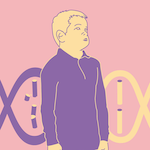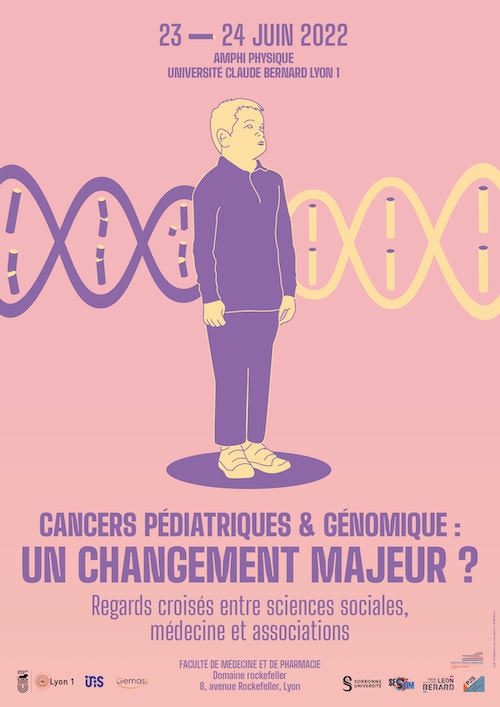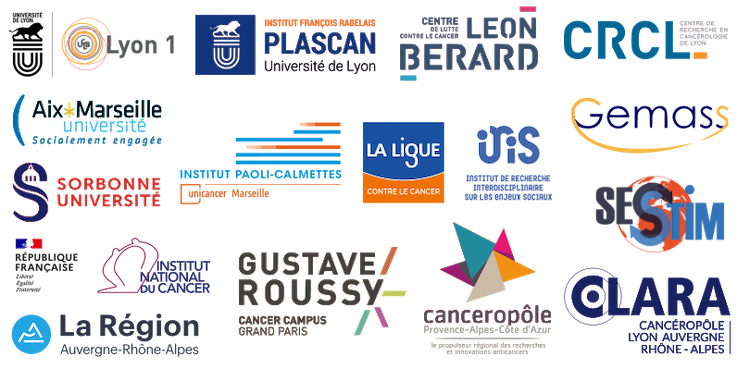Navigation
SUPPORT
|
Présentation
L’objectif de ce colloque est de présenter des travaux de sciences sociales portant sur le développement de la médecine génomique en oncologie pédiatrique. Il s’agit plus particulièrement de s’intéresser aux enjeux sociaux, éthiques, juridiques et organisationnels de la prise en charge des cancers de l’enfant au prisme des changements technologiques et thérapeutique récents. Une attention particulière sera également portée autour des approches méthodologies nécessaire au recueil de l’expérience des enfants et adolescents malades et de leurs proches (Besle et Carof, 2020). Depuis une vingtaine d’années, l’amélioration des technologies de séquençage ainsi que l’arrivée de nouvelles classes thérapeutiques (thérapies ciblées, immunothérapies, thérapies géniques) renouvelle l’espoir d’une amélioration de la prise en charge des cancers pédiatriques et notamment de ses formes les plus avancées (on estime que 20 % des cancers de l’enfant rechutent) (Lacour, et al., 2014). De nombreux essais cliniques, se sont ainsi développés dans les pays occidentaux depuis une dizaine d’années pour étendre l’accès au séquençage génomique (MAPPYACTS, INFORM, iTher) et améliorer l’accès aux thérapies ciblées dans les cancers pédiatriques (Match-R, ESMART) (Harttrampf et al. 2017). Dans ce contexte de développement de la médecine de précision, deux essais académiques ont été développés en 2016 : MAPPYACTS, le premier étant une étude de séquençage génomique de la tumeur, qui permet aux jeunes patients d’avoir accès, en fonction des résultats obtenus, à une thérapie ciblée, proposée dans certains cas par le deuxième AcSé-ESMART. Ces deux essais ont fait l’objet d’une recherche portant sur l’« accès des enfants, adolescents et jeunes adultes atteints de cancers avancés aux innovations thérapeutiques en Europe » (ACCE) qui a permis de montrer les enjeux professionnels et familiaux posés par l’arrivée de ces techniques de séquençage haut débit à un moment du parcours médical dans lequel les traitements standards ne fonctionnent plus. Dans le même mouvement de développement de ces techniques qui remettent en cause les frontières entre soins et recherche, différents pays se sont dotés ces dernières années de plans nationaux d’accès au séquençage (Genomics England, Plan France Médecine Génomique 2025, The Precision Medicine Initiative aux Etats-Unis) contribuant ainsi à diffuser ces pratiques. Déjà bien établie en cancérologie pédiatrique (Castel and Dalgalarrondo 2005; Oberman and Frader 2003), la participation à des démarches expérimentales se normalise ainsi encore plus avec le développement de la médecine génomique non seulement avec l’inclusion de nombreux enfants à des stades plus avancés du cancer mais également dès le diagnostic de la maladie. Si à certain égard cette distinction entre soin et recherche peut sembler s’atténuer (Cambrosio et al. 2019) elle reste encore très présente dans une perspective éthique et juridique. L’engouement pour cette médecine génomique et son déploiement massif dans certains pays pose de nombreuses questions à la fois médicales et sociétales. En effet, le recours à ces technologies de séquençage reste largement expérimental, ses bénéfices cliniques n’ayant pas encore été totalement prouvés, ce qui pose des questions éthiques en termes de compréhensions, d’informations et de consentements pour les parents et les jeunes patients (de Montgolfier, et al., 2021). De plus, la possibilité de découverte incidente de prédispositions individuelles ou familiales de cancer ou de maladie génétique pose des problématiques éthiques, juridiques et psychologiques inédites dont les conséquences ne sont pas encore totalement appréhendées. Ces enjeux ont fait l’objet d’un projet de recherche (GeneInfoKid) qui a permis de décrire la perception que les professionnels, les enfants et les parents de ces nouvelles approches génomiques en cancérologie. L’arrivée progressive de ces techniques de séquençage haut débit « en routine » pose également des questions d’organisation du système de santé (circulation des patients, médecin prescripteur, médecin généticien) et de viabilité économique. Ce colloque souhaite ainsi étendre ces réflexions en présentant de nombreux travaux internationaux portant sur différents axes : Redécoupage de la frontière entre soin recherche Ce premier axe interrogera la frontière entre « soins » et « recherche », frontière qui est reconfigurée par l’utilisation de la recherche expérimentale et des études de séquençage de plus en plus tôt dans le parcours de soins des enfants et adolescents. Dans quelle mesure cette frontière fait-elle encore sens ? Quelles conséquences ce redécoupage a-t-il sur les enfants et leurs familles, par exemple en termes de compréhensions ? Inégalités d’accès aux soins Le deuxième axe analyse la réorganisation des soins dans le contexte de développement d’une médecine hautement spécialisée et technologique qui entraine des enjeux spécifiques en termes d’accès : inégalités sociales et géographiques, collaborations entre les équipes médicales, nouvelles temporalités dans le parcours de soin et la maladie. L’individualisation induite par cette médecine dite de précision interroge sur la manière dont ces technologies de pointe peuvent être mise à disposition de tous les enfants malades sans accentuer les différences de prise en charge selon les territoires ou les niveaux socio-économiques. Mobilisations sociales Le colloque sera l’occasion d’identifier la place et le rôle des acteurs principaux que sont les parents et enfants et de témoigner de leurs attentes et de leurs questionnements ainsi que de leurs actions dans le champ de la médecine personnalisée. L’importance et la diversité des formes de mobilisation sociale (soutien à la recherche, aide logistique dans les services de soin, aide aux familles, activités pour les enfants) dans le champ des cancers pédiatriques est particulièrement remarquable notamment autour d’une multitude d’associations d’anciens enfants malades et de parents. Comprendre comment ces associations s’approprient les enjeux de cette médecine génomique est donc essentiel. Consentement et données Le colloque aura pour objet de saisir les modalités actuelles du cadre juridique et éthique de la médecine génomique concernant l’enfant, en analysant notamment l’évolution du cadre légal (loi de bioéthique, 2021). Dans cette perspective, les enjeux d’information et de consentement, de collecte, de conservation et de ré-utilisation des données à des fins de traitements ou de recherche seront analysés. L’objectif sera de mettre en particulier l’accent sur les pratiques et les enjeux éthiques identifiés par les acteurs dès lors que les données biomédicales récupérées dans un contexte de recherche concernent un enfant ou adolescent malade. Parole des enfants Le colloque aura enfin pour objet de saisir tant du point de vue des équipes médicales que des chercheurs en sciences sociales les modalités de la participation des enfants au côté de leurs familles à la décision dans le contexte de la médecine personnalisée. Les enjeux éthiques et méthodologiques propres à la récupération de cette parole seront également interrogés. BibliographieBesle S. et Carof S., 2020. « Saisir la parole des enfants atteints de cancers avancés », In Côté I., Lavoie K. et Trottier-Cyr R. P. (dir.), La Méthodologie de recherche centrée sur l’enfant : recueillir et restituer la parole des enfants et des adolescents. Laval, Presse universitaire de Laval : 195-218. Castel, Patrick, and Sébastien Dalgalarrondo. 2005. “Les Dimensions Politiques de La Rationalisation Des Pratiques Médicales.” Sciences Sociales et Sante 23(4):5–40. Bourret, P., & Cambrosio, A. (2019). Genomic expertise in action : Molecular tumour boards and decision-making in precision oncology. Sociology of Health & Illness, 41(8), 1568-1584. https://doi.org/10.1111/1467-9566.12970 de Montgolfier, S., Hervouet, L., Le Tirant, S., & Rial-Sebbag, E. (2021). Intégrer l’avis de l’enfant dans les décisions de soin : Le cas du consentement aux investigations génétiques en oncopédiatrie. Anthropologie & Santé. Revue internationale francophone d’anthropologie de la santé. http://journals.openedition.org/anthropologiesante/9269 Harttrampf, Anne C., Ludovic Lacroix, Marc Deloger, Frederic Deschamps, Stephanie Puget, Nathalie Auger, Philippe Vielh, Pascale Varlet, Zsofia Balogh, Samuel Abbou, Adrien Allorant, Dominique Valteau-Couanet, Sabine Sarnacki, Louise Gamiche-Rolland, Guillaume Meurice, Veronique Minard-Colin, Jacques Grill, Laurence Brugieres, Christelle Dufour, Nathalie Gaspar, Stefan Michiels, Gilles Vassal, Jean Charles Soria, and Birgit Geoerger. 2017. “Molecular Screening for Cancer Treatment Optimization (MOSCATO-01) in Pediatric Patients: A Single-Institutional Prospective Molecular Stratification Trial.” Clinical Cancer Research 23(20):6101–12. Lacour, Brigitte, Stéphanie Goujon, Sandra Guissou, Aurélie Guyot-Goubin, Solène Desmée, Emmanuel Désandes, and Jacqueline Clavel. 2014. “Childhood Cancer Survival in France, 2000–2008.” European Journal of Cancer Prevention 23(5):449–57. Oberman, Michelle, and Joel Frader. 2003. “Dying Children and Medical Research: Access to Clinical Trials as Benefit and Burden.” American Journal of Law & Medicine 29(2–3):301–17.
Avec le soutien de :
|




